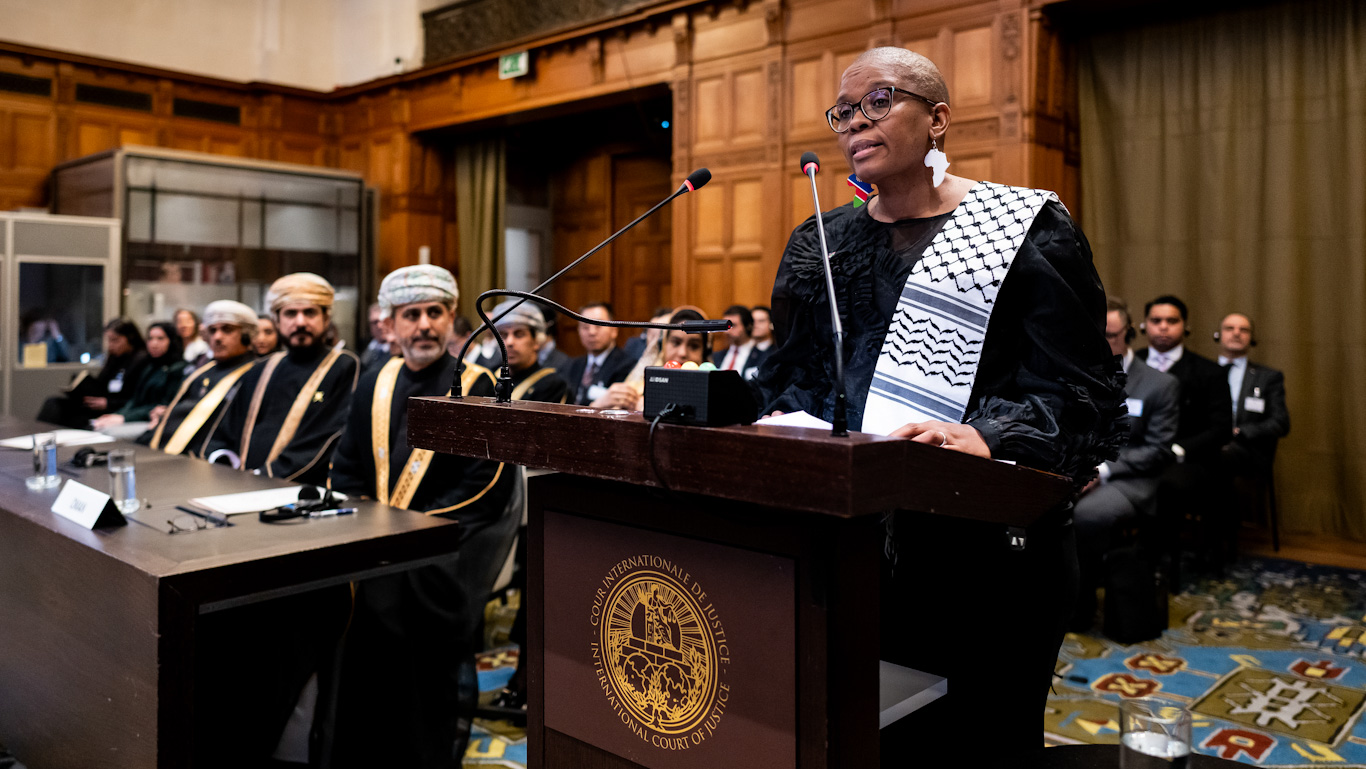
OPINION & ANALYSIS
The distance between Gaza and Namibia is measured in the thousands of kilometers. But the historical distance is much closer. This is precisely why Namibia was one of the first countries to take a strong stance against the Israeli genocide in Gaza.
Namibia was colonized by the Germans in 1884, while the British colonized Palestine in the 1920s, handing the territory to the Zionist colonizers in 1948.
Though the ethnic and religious fabric of Palestine and Namibia differ, the historical experiences are similar.
It is easy, however, to assume that the history that unifies many countries in the Global South is only that of Western exploitation and victimization. It is also a history of collective struggle and resistance.
Namibia has been inhabited since prehistoric times. This long-rooted history has allowed Namibians, over thousands of years, to establish a sense of belonging to the land and to one another, something that the Germans did not understand or appreciate.
When the Germans colonized Namibia, giving it the name of ‘German Southwest Africa,’’ they did what all other Western colonialists have done, from Palestine to South Africa to Algeria, to virtually all Global South countries. They attempted to divide the people, exploited their resources and butchered those who resisted.
Although a country with a small population, Namibians resisted their colonizers, resulting in the German decision to simply exterminate the natives, literally killing the majority of the population.
Since the start of the Israeli genocide in Gaza, Namibia answered the call of solidarity with the Palestinians, along with many African and South American countries, including Colombia, Nicaragua, Cuba, South Africa, Brazil, China and many others.
Though intersectionality is a much-celebrated notion in Western academia, no academic theory is needed for oppressed, colonized nations in the Global South to exhibit solidarity with one another.
So when Namibia took a strong stance against Israel’s largest military supporter in Europe – Germany – it did so based on Namibia’s total awareness of its history.
The German genocide of the Nama and Herero people (1904-1907) is known as the “first genocide of the 20th century”. The ongoing Israeli genocide in Gaza is the first genocide of the 21st century. The unity between Palestine and Namibia is now cemented through mutual suffering.
However, Namibia did not launch a legal case against Germany at the International Court of Justice (ICJ); it was Nicaragua, a Central American country thousands of miles away from Palestine and Namibia.
The Nicaraguan case accuses Germany of violating the ‘Convention on the Prevention and Punishment of the Crime of Genocide.’ It rightly sees Germany as a partner in the ongoing genocide of the Palestinians.
This accusation alone should terrify the German people, in fact, the whole world, as Germany has been affiliated with genocides from its early days as a colonial power. The horrific crime of the Holocaust and other mass killings carried out by the German government against Jews and other minority groups in Europe during WWII is a continuation of other German crimes committed against Africans decades earlier.
The typical analysis of why Germany continues to support Israel is explained based on German guilt over the Holocaust. This explanation, however, is partly illogical and partly erroneous.
It is illogical because if Germany has, indeed, internalized any guilt from its previous mass killings, it would make no sense for Berlin to add yet more guilt by allowing Palestinians to be butchered en masse. If guilt indeed exists, it is not genuine. It is erroneous because it completely overlooks the German genocide in Namibia. It took the German government until 2021 to acknowledge the horrific butchery in that poor African country, ultimately agreeing to pay merely one billion euros in ‘community aid,’ which will be allocated over three decades.
The German government’s support of the Israeli war on Gaza is not motivated by guilt but by a power paradigm that governs the relations among colonial countries. Many countries in the Global South understand this logic very well, thus the growing solidarity with Palestine.
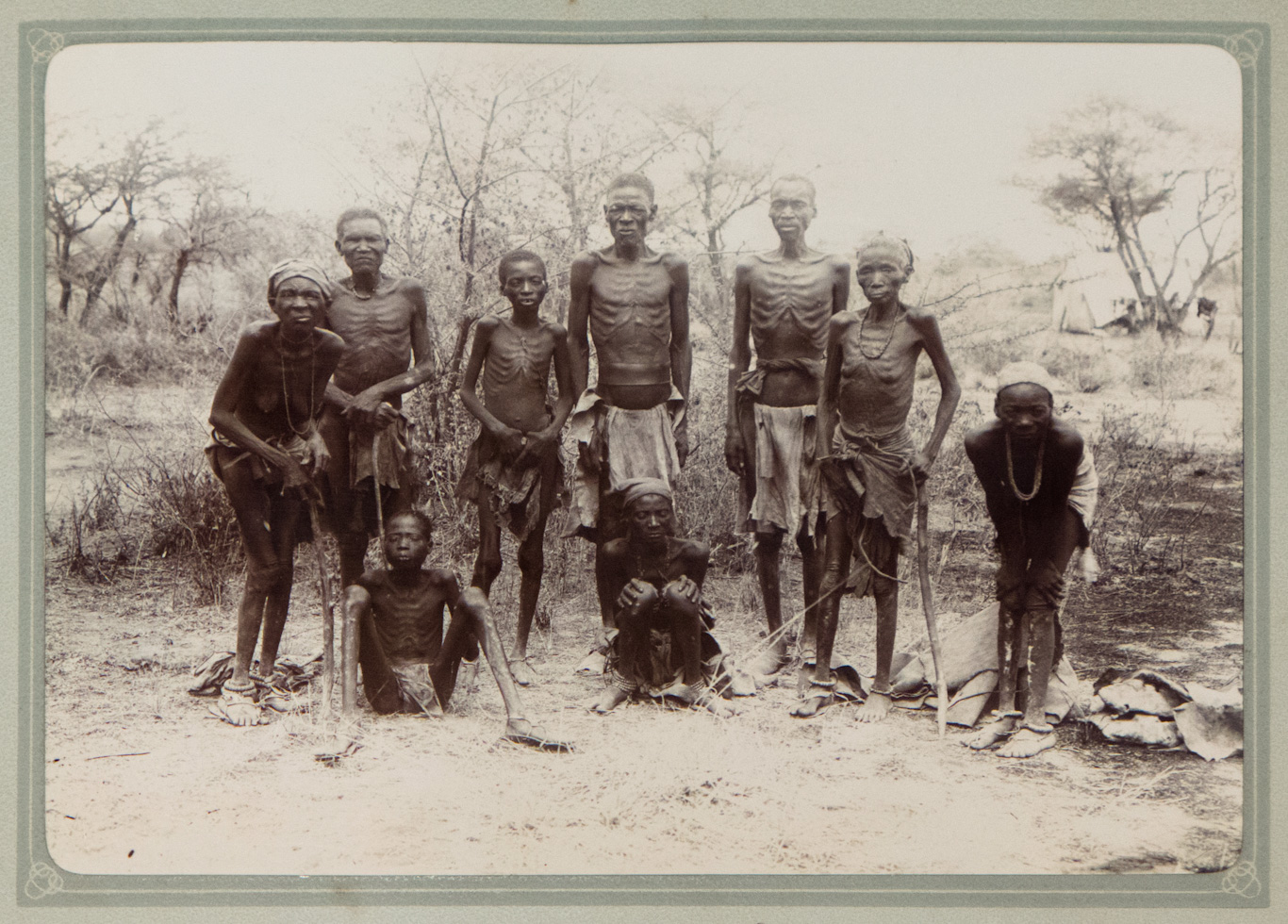
The Israeli brutality in Gaza, but also the Palestinian sumud, resilience and resistance, are inspiring the Global South to reclaim its centrality in anti-colonial liberation struggles.
The revolution in the Global South’s outlook—culminating in South Africa’s case at the ICJ and the Nicaraguan lawsuit against Germany—indicates that change is not the outcome of a collective emotional reaction. Instead, it is part and parcel of the shifting relationship between the Global South and the Global North.
Africa has been undergoing a process of geopolitical restructuring for years. The anti-French rebellions in West Africa, demanding true independence from the continent’s former colonial masters, and the intense geopolitical competition involving Russia, China and others are all signs of changing times. And with this rapid rearrangement, a new political discourse and popular rhetoric are emerging, often expressed in the revolutionary language emanating from Niger, Burkina Faso, Mali and others.
But the shift is not happening only on the rhetorical front. The rise of BRICS as a powerful new platform for economic integration between Asia and the rest of the Global South has opened up the possibility of alternatives to Western financial and political institutions.
In 2023, it was revealed that BRICS countries hold 32 percent of the world’s total GDP, compared to 30 percent held by the G7 countries. This has much political value, as four of the five original founders of BRICS are strong and unapologetic supporters of the Palestinians.
While South Africa has been championing the legal front against Israel, Russia and China are battling the US at the UN Security Council to institute a ceasefire. Beijing’s Ambassador to The Hague defended the Palestinian armed struggle as legitimate under international law.
Now that global dynamics are working in favor of Palestinians, it is time for the Palestinian struggle to return to the embrace of the Global South, where shared histories will always serve as a foundation for meaningful solidarity.
Feature photo | Hon. Yvonne Dausab, Minister of Justice of Namibia, joined representatives of over 50 nations in presenting testimony to the International Court of Justice on the legality of the Israeli occupation. Photo | International Court of Justice
Dr. Ramzy Baroud is a journalist, author and the Editor of The Palestine Chronicle. He is the author of six books. His latest book, co-edited with Ilan Pappé, is ‘Our Vision for Liberation: Engaged Palestinian Leaders and Intellectuals Speak Out.’ His other books include ‘My Father Was a Freedom Fighter’ and ‘The Last Earth.’ Baroud is a Non-resident Senior Research Fellow at the Center for Islam and Global Affairs (CIGA). His website is www.ramzybaroud.net
The views expressed in this article are the author’s own and do not necessarily reflect MintPress News editorial policy.
![]() Republish our stories! MintPress News is licensed under a Creative Commons Attribution-NonCommercial-ShareAlike 3.0 International License.
Republish our stories! MintPress News is licensed under a Creative Commons Attribution-NonCommercial-ShareAlike 3.0 International License.
———————
How Israeli legal squad fumbled, failed, got exposed at ICJ genocide hearing
Sunday, 14 January 2024 1:28 PM [ Last Update: Sunday, 14 January 2024 1:28 PM ]
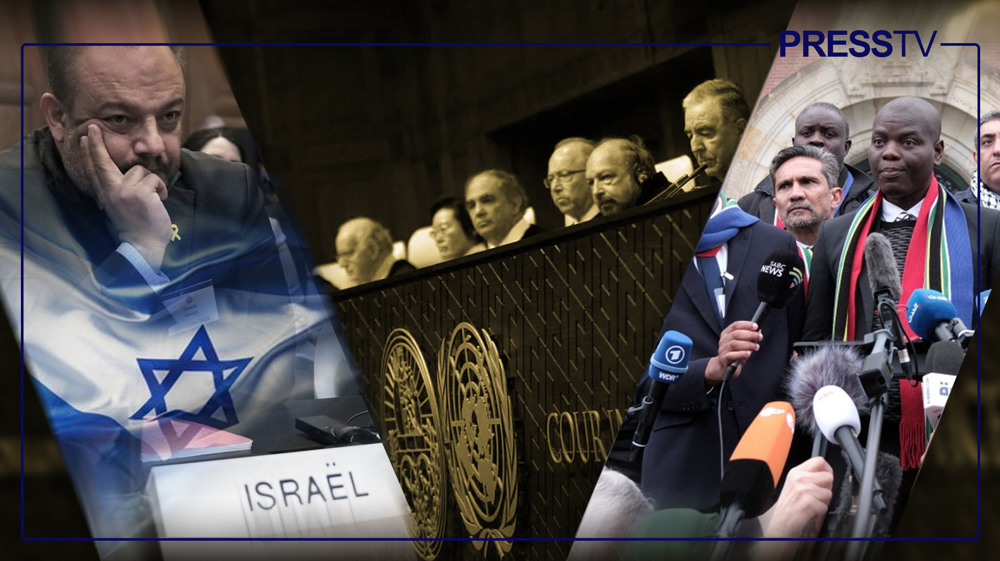
By Ivan Kesic
South Africa on Thursday presented compelling evidence of the Israeli genocide in the Gaza Strip before the International Court of Justice (ICJ), which was followed by incoherent rhetoric by a team of lawyers representing Tel Aviv, who tried to defend the indefensible.
The team of lawyers representing the South African government presented an exhaustive, well-researched 84-page document at the top UN court in the Hague, explaining that Israel is committing genocide against Palestinians in Gaza, by using a variety of methods.
They include causing serious bodily and mental hurt, forced evacuation of people, widespread hunger, and bringing about “physical destruction” of people in the small besieged territory.
In their opening remarks, the South African team said they “place Israel’s genocidal acts and omissions within the broader context of Israel’s 56-year occupation, 25-year apartheid, and 16-year siege imposed on the Gaza Strip.”
“The point is not simply that Israel is acting disproportionately. The point is that the prohibition on genocide is an absolute,” said Vaughan Lowe, one of the South African lawyers.
More than 23,500 people have already been killed in Gaza in the past 100 days, a vast majority of them children and women. Thousands more are lost under rubble and presumed dead.
Physicians, aid workers and journalists have also been killed deliberately by the Israeli regime’s forces, and the damage to the civil infrastructure is enormous and disproportionate to anything seen before.
On Thursday, the legal team representing South Africa requested that the court issue emergency measures to stop the relentless aerial bombardment and ground invasion of the Gaza Strip.
With this action, South Africa showed that its people still remember and respect Nelson Mandela’s words: “We know very well that our freedom is incomplete without the freedom of the Palestinians.”
In its Friday counter-submission, lawyers representing the Israeli regime laid out its “defense”.
Led by veteran British lawyer Malcolm Shaw, the team of lawyers argued that South Africa’s application “distorted” and “decontextualized” Israeli military actions in Gaza.
The team of lawyers representing the regime also made some outlandish claims, repeating lies peddled by the Israeli and Western media, such as the beheading of babies and hospitals not being bombarded.
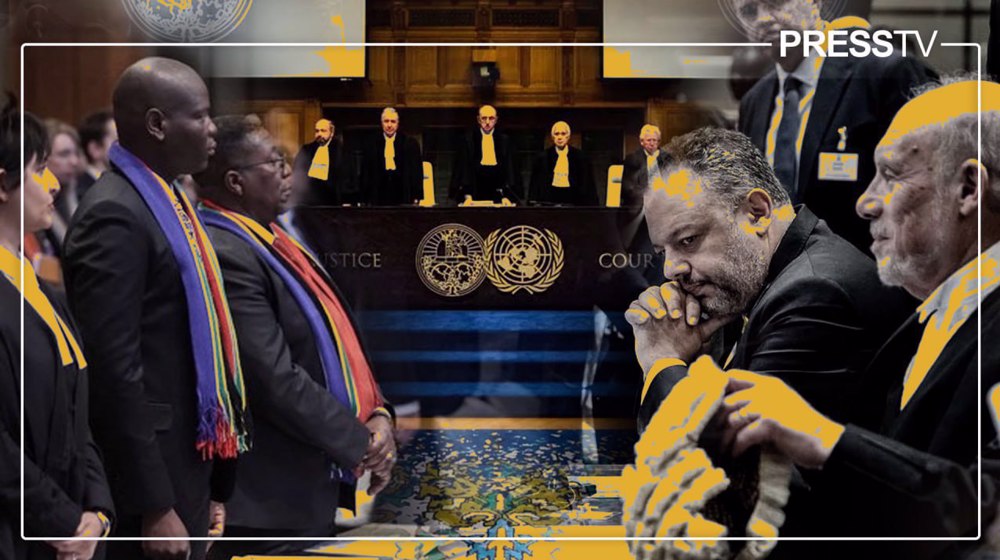
Explainer: What’s next for Israeli regime after ICJ genocide hearing?
The lie about Israeli children “beheaded” by the Hamas was debunked long ago. Even the Israeli media recently admitted that the Oct. 7 killings were linked to the regime’s military in line with the so-called Hannibal Directive.
The claim that no hospitals have been bombed by the Israeli regime in Gaza also holds no water. Images of dozens of hospitals being attacked and inmates being killed have been doing rounds on social media.
Such was the confusion that Shaw misplaced a page of his presentation, cutting a sorry figure.
Tal Becker, a legal adviser for the regime’s foreign ministry, presented opening statements, arguing that South Africa had “ignored” the events of October 7 and that Israel had “the right to defend itself.”
He also told the court that the Genocide Convention was drawn up in the aftermath of the Holocaust and that the phrase “never again” is one of “the highest moral obligations” for Israel.
Becker rejected requests for an interim order, arguing South Africa is trying to deny Israel “the opportunity to meet its obligations” to the captives.
Legal experts were quick to criticize Becker’s presentation, primarily because it moralizes based on anachronistic events from World War II, irrelevant to contemporary politics.
This represents the continuation of decades of the Zionist victimhood narrative, by which the Israeli regime’s crimes and dirty policies are sought to be justified by victims from the past.
Becker manipulatively accused South Africa of ignoring October 7, specifically Operation Al-Aqsa Storm, the catastrophic Israeli military defeat that the regime likes to manipulate to be an alleged “war crime.”
In reality, South Africa resolutely placed the genocide in the context of the long-term Israeli occupation, apartheid and siege of Gaza, which the Israeli regime ignored in its presentation and invoked its own interpretation on October 7.
Legal experts point out that Israel’s arguments were abysmally weak and incoherent because no events of that date give the right to a war crime of a disproportionate nature.
They further argue that as an occupying entity that has grabbed the land of Palestine by force, the Israeli regime does not have “the right to self-defense” so this argument also does not hold water.
In 2003, the ICJ ruled that an occupying power cannot claim the right to self-defense, in a case involving Israel’s construction of a separation wall in the occupied West Bank.
The Israeli regime’s legal team claimed that South Africa’s accusation about Zionist officials harboring an inherent intent to destroy the Palestinian people was based on “random assertions.”
That is also a shoddy argument since top regime officials, including parliamentarians, the war minister, the president and the premier have called for genocide and ethnic cleansing of Palestinians.
After Israel’s final “defense,” South Africa’s Minister of Justice Ronald Lamolathe said the Israeli regime has suffered a shameful defeat.
He also rejected flawed Israeli denials, stressing that genocide “is never declared in advance” and evidence for 13 weeks is at the disposal of the ICJ that shows the Israeli regime has committed genocide.
Ivan Kesic is an independent journalist and researcher.
(The views expressed in this article do not necessarily reflect those of Press TV)
Press TV’s website can also be accessed at the following alternate addresses:
—————————-
Bolivia says will join South Africa’s ICJ case against Israel for genocide in Gaza
Monday, 08 January 2024 11:06 PM [ Last Update: Tuesday, 09 January 2024 3:08 AM ]
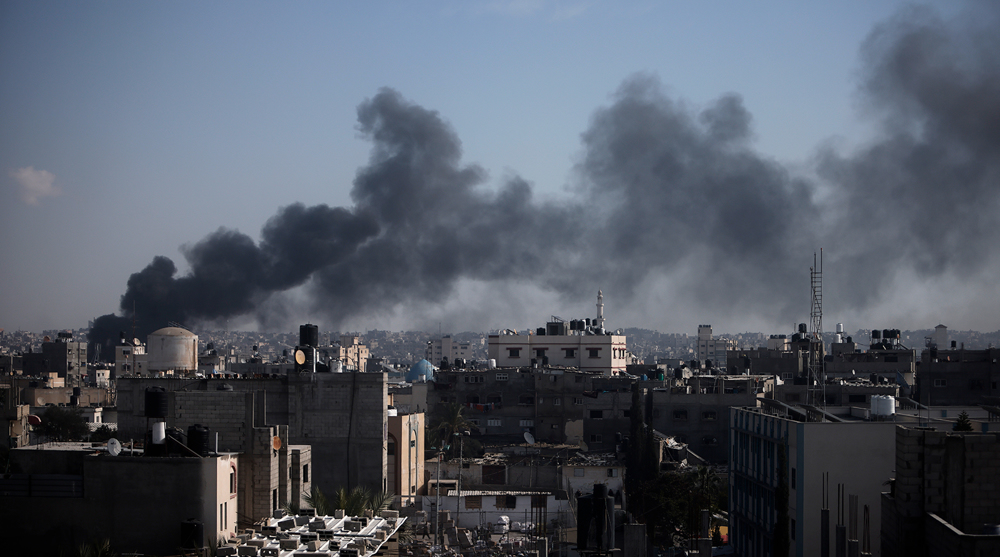
Smoke billows from Palestinian buildings following an Israeli strike against the city of Khan Yunis in southern Gaza Strip on January 6, 2024. (Photo by AP)
Bolivia says it will join South Africa in a legal case filed against the Israeli regime in the International Court of Justice (ICJ) for committing genocide against Palestinians in the besieged Gaza Strip.
The Palestinian Information Center quoted Bolivia’s Foreign Ministry as making the announcement in a statement on Monday.
La Paz said it praised the step taken by Pretoria in line with its commitment to the UN Genocide Convention.
Bolivia added that the judicial measure taken by South Africa was a “historic step” in defense of the rights of the Palestinian people and the Palestinian cause of liberation from Israeli occupation and aggression.
The Bolivian Foreign Ministry also called on the international community to throw its full weight behind this initiative.
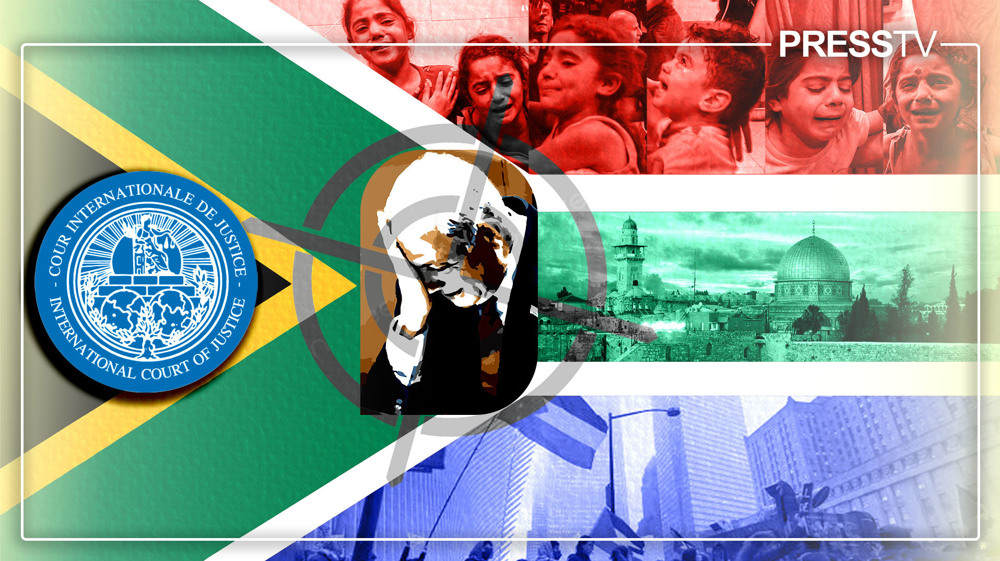
Explainer: What is the significance of South Africa dragging Israel to ICJ?
It noted that the country — along with South Africa, Bangladesh, Comoros, and Djibouti — has also presented a separate request to the prosecutor of the International Criminal Court (ICC) to investigate the situation in Palestine.
Bolivia is the first country in Latin America to announce its support of South Africa’s lawsuit.
In late December, South Africa started proceedings against Israel at the ICJ over the regime’s genocide in Gaza. The lawsuit says Israel’s actions are “genocidal in character because they are intended to bring about the destruction of a substantial part of the Palestinian national, racial and ethnic group.”
“The acts in question include killing Palestinians in Gaza, causing them serious bodily and mental harm, and inflicting on them conditions of life calculated to bring about their physical destruction,” the lawsuit says.
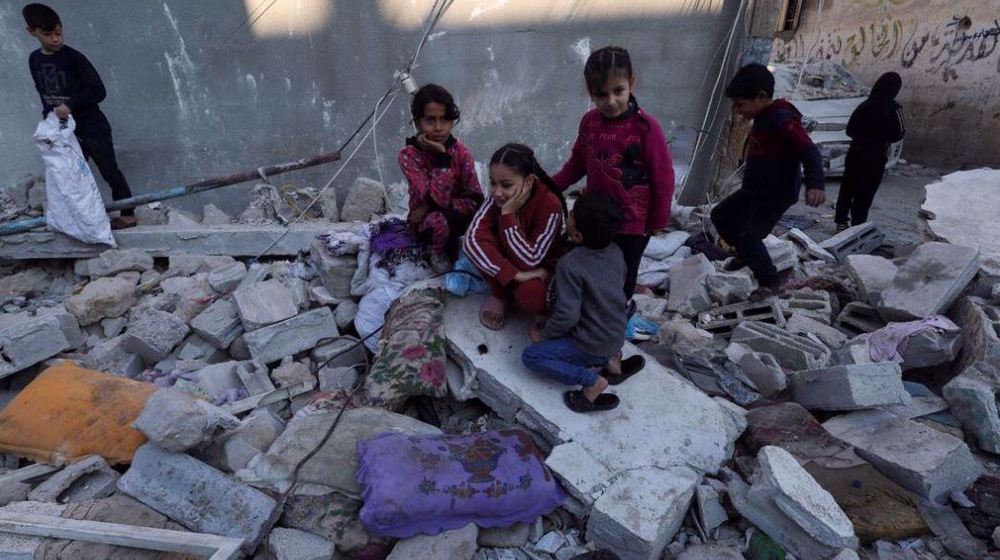
UK accused of double standards for not backing genocide case against Israel at ICJ
In early January, it was announced that the ICJ judges in The Hague will hear South Africa’s case against Israel on January 11 and 12. The announcement came after the African country asked the top court to urgently declare that the Tel Aviv regime has breached its responsibilities under international law since October 7, when it launched its onslaught against Gaza.
More than 23,000 Palestinians, most of them women and children, have been killed and nearly 59,000 injured in Israel’s genocidal war on Gaza.
Press TV’s website can also be accessed at the following alternate addresses:
———————
New Book Claims White Nations ‘Love Jews’ Only When They Are ‘Dead’
By CFT Team — 13 Comments

(Jerusalem Post) Dara Horn — the author of the jewishly provocative book entitled People Love Dead Jews — has found a new and maudlin way of looking at Jewish “suffering” that allows them to continue to wallow in self-pity and retain their proudly coveted title as the world’s most universally loathed people.
The Jerusalem Post published an interview with Dara Horn which gave her the opportunity to critique “gentiles” for allegedly using the suffering and death of Jews in order to feel better about themselves — that somehow when we show sympathy for dead Jews, we feel morally superior — a mental projection that says more about Jews than it does about “gentiles”:
[Excerpt]
People Love Dead Jews….is a collection of anecdotes, her own and of others, reports and stories, all highlighting the seeming paradox of non-Jewish Western society accepting – even showing interest and fascination in – the stories of Jews but having trouble allocating space in the present world for ones who exist now.
Nearly a year after its initial release,….[Horn] discussed the year, the book and the impression its release has left on her and on the world at large:
JP: Your book addresses live issues, issues that any Jew in the Diaspora has to deal with.
“It’s very emotionally different from novels. As a writer, you’re thrilled when people want to read your book and are interested in it, but with this one, I kind of wish people liked it a little less.”
Why?
“I don’t want to be right about this, [and] I was much more right than I thought I was. That’s been disturbing.”
As an author, especially of a book like this, Horn gets reader mail, but the ones from Jews stand out, and all have a slightly similar structure.
“The Jewish readers are from all walks of life but all say the same thing: ‘I’ve felt uncomfortable my whole life and I never knew why. Your book articulated this for me, thank you.’”
They always follow with a retelling of an uncomfortable interaction they had that follows the model of the book.
One woman wrote to her about how, as an actress, she had been going to auditions for two years, and every casting director would tell her that she looked too Jewish for the part, even when it was a Jewish part. The woman is now a voice actor.
Another told of his [student] exchange experience at a university in Germany, where he received a warm welcome and was even asked to do a presentation for Kristallnacht. The end of semester exam was scheduled for Saturday, so the student asked the professor for an accommodation. The professor said they couldn’t accommodate, and the student failed the course.
That’s poignant.
From schoolchildren wondering aloud in the Dallas Holocaust Museum if Jews still exist today to the bizarre experience Horn’s children had in their elementary school study of ancient civilizations, she is convinced the root of the problem is a combination educational and cultural.
In her school district, sixth grade is when students study ancient civilizations. “At some point during the year, each kid came home very confused because they learned about all these ancient civilizations. But at home, for each of these civilizations, we have a holiday about how they tried to kill us. Are they great or are they not?
“There are some baseline problems in the way that people talk about Jewish history in non-Jewish societies,” she said, “and people want this problem solved.
“Across America, you have so many people who just don’t know [enough] because most Jewish communities are concentrated, not spread out. The only thing they know about Jews is what they learned in their high school history textbooks, which is that they died in the Holocaust.”
What’s missing?
“Jewish civilization is this counterculture that runs through the whole history of the West, challenging it. That’s why people don’t want to talk about it because it would ruin the story to see Jews as anything other than powerless victims,” she explained. When, in reality, “it’s hard to understand the history of the West without understanding Jewish history. The textbook model doesn’t fit with that.
Does Israel have a place in this conversation?
“Israelis don’t need this book because Israelis have solved this problem: Israelis don’t understand antisemitism because they don’t have to,” Horn explained.
“For Israelis, antisemitism is only about violence, so they only understand it as that. The psychological compromise with people who don’t respect you is not there. That’s the triumph of Zionism.”
That’s why it resonated.
“What’s been really heartening is the responses from non-Jews. People have a lot of goodwill [and want to learn more,] which is encouraging,” Horn said, adding that other minority groups have reached out saying they identify with the problem…
Yes, Jews just can’t figure out why white civilizations don’t bend over backwards to accommodate them — or any other racial minorities — who are trying to subvert them from within.
If white people go to live in Japan, they don’t complain about being treated differently and demand laws be changed to make them feel accepted — only Jews do that.
Only Jews spend millions of dollars each year conducting surveys — and even operating a centralized “command center” — to monitor and determine how much they are hated in every country in which they happen to dwell.
And when they act as the “counterculture” in white nations — a revolutionary fifth column — they become universally resented — and then complaining that a white nation doesn’t “understand” Jews or their culture is the essence of Jewish culture — they must feel to be outsiders to feel Jewish.
This demand for attention and accommodation — while at the same time insisting on remaining separate and subversive — shows a profound pathological narcissism.
Why should white people accommodate — that is, judaize — their own nations just so that Jews feel welcomed and “normal”?
To do so would be national suicide — erasing our heritage and identity and replacing it with a universal Jewish zeitgeist which is irreconcilable with our values and traditions.
Horn claims that white people like Jews only when they are dead — and she couldn’t be more wrong — because when they are dead — or alleged to be dead — they never let us forget it and force our children to study dead Jews in our own schools from the time they are barely able to read so that they won’t grow up and hate Jews.
After that non-stop “education” about Jewish suffering, the Jews turn around and claim that the only thing we know — or want to know — about Jews is their suffering.
